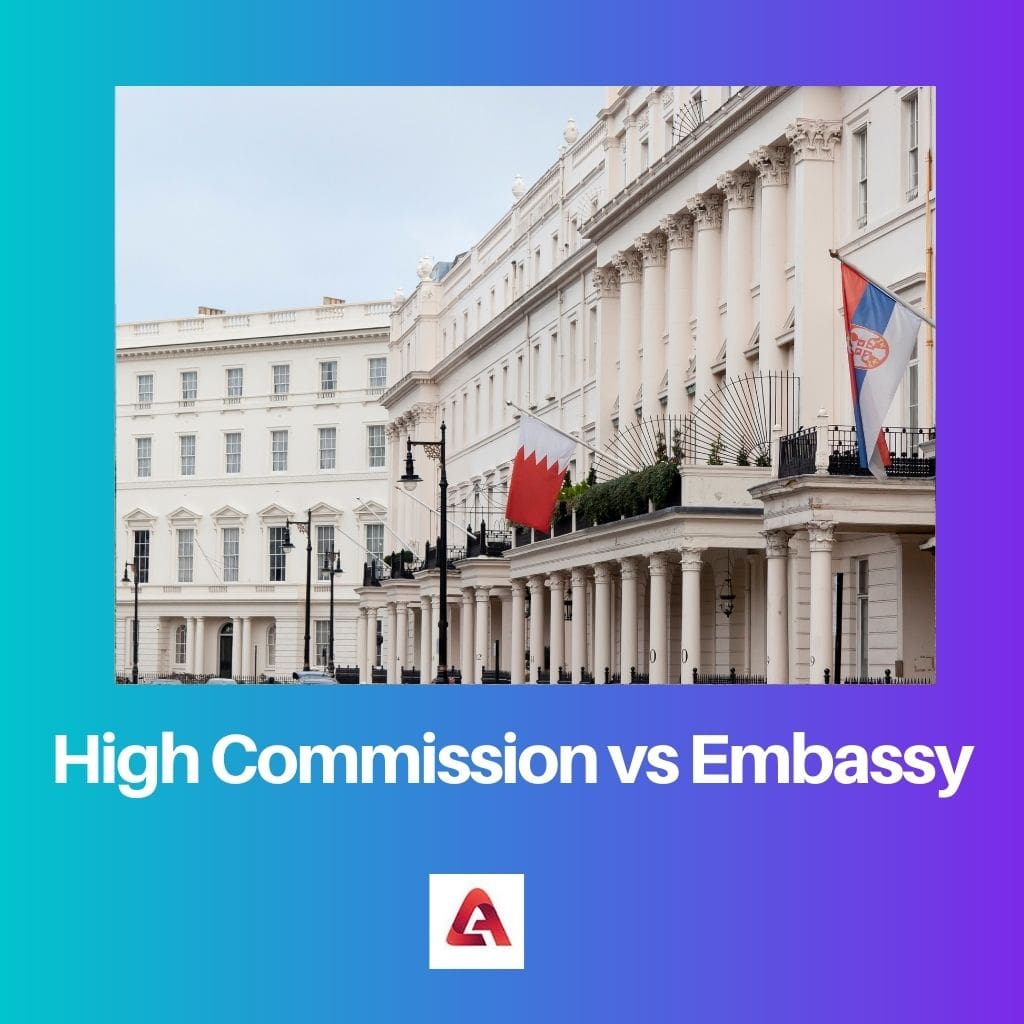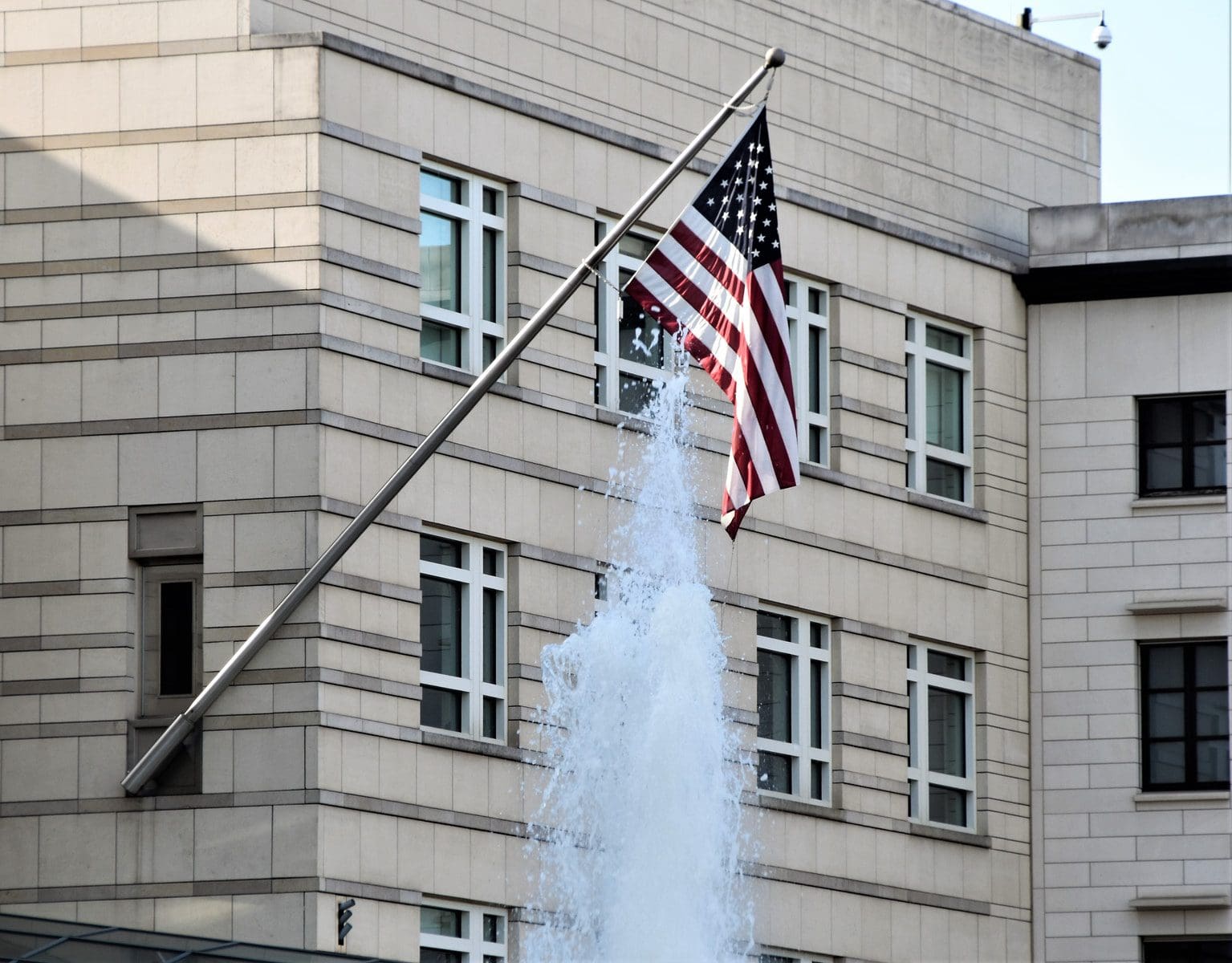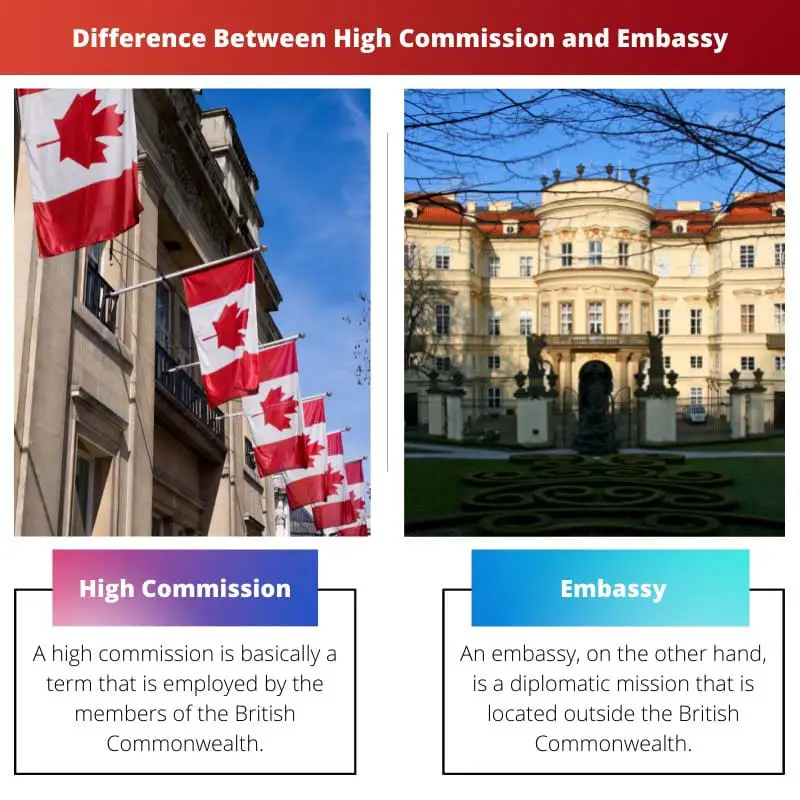A High Commission is used to represent one Commonwealth country in another, between countries sharing the British monarch as head of state. It deals with diplomatic matters and consular services. On the other hand, an Embassy serves a similar purpose but is used between countries that do not share the same head of state, offering representation and diplomatic functions. Both are sovereign territories of the respective countries they represent.
Key Takeaways
- The high commission is the diplomatic representation of one Commonwealth country in another, while the embassy is the diplomatic representation of one country in another.
- The high commission is used by Commonwealth countries, while the embassy is used by non-Commonwealth countries.
- A High Commissioner heads the high commission, while an Ambassador heads the embassy.
High Commission vs Embassy
High Commission is a diplomatic mission established by a Commonwealth country in another Commonwealth country, and a High Commissioner, the equivalent of an ambassador, heads it. Embassy is a diplomatic mission established by a country in another country, and an ambassador heads it, the highest-ranking diplomatic representative of the sending country.

Comparison Table
| Feature | High Commission | Embassy |
|---|---|---|
| Function | Represents one Commonwealth country in another | Represents one country in another non-Commonwealth country |
| Head of Mission | High Commissioner | Ambassador |
| Historical Connection | Established between countries with a shared historical connection as part of the British Empire | Established between independent nations without a specific historical connection |
| Terminology | The building housing the mission is called a High Commission | The building housing the mission is called an Embassy |
| Location | Typically located in the capital city of the host country | Typically located in the capital city of the host country |
| Responsibilities | Similar to embassies, including: * Diplomatic relations: Representing the home country to the host government, negotiating agreements, and fostering political ties. * Consular services: Providing assistance to citizens of the home country residing in the host country, such as issuing passports and visas, and handling emergencies. * Cultural exchange: Promoting cultural understanding and collaboration between the two countries. | Similar to high commissions, including: * Diplomatic relations: Representing the home country to the host government, negotiating agreements, and fostering political ties. * Consular services: Providing assistance to citizens of the home country residing in the host country, such as issuing passports and visas, and handling emergencies. * Cultural exchange: Promoting cultural understanding and collaboration between the two countries. |
What is High Commission?
A High Commission is a diplomatic mission representing one Commonwealth country in another, established primarily among nations sharing the British monarch as head of state. It serves as the official representation of the sending country in the host nation, performing a range of diplomatic functions and providing consular services to citizens.
Diplomatic Representation
The High Commission acts as the principal diplomatic channel between the sending and host countries, facilitating communication, negotiation, and collaboration on various matters of mutual interest. This includes political, economic, cultural, and security-related affairs, with the aim of fostering strong bilateral relations.
Consular Services
In addition to diplomatic duties, the High Commission provides consular assistance to citizens of the sending country residing or traveling within the host nation. This assistance may include issuing visas, passport services, offering legal support, and providing guidance during emergencies such as accidents or natural disasters.
Sovereign Territory
A High Commission operates within its own sovereign territory, which is considered an extension of the sending country’s jurisdiction. This territory enjoys certain legal immunities and privileges, allowing the High Commission to carry out its diplomatic and consular functions independently and effectively.

What is Embassy?
An Embassy is a diplomatic representation of one sovereign state in another, established to foster bilateral relations, facilitate communication, and handle various diplomatic affairs. It serves as the official outpost of the sending country in the host nation, playing a crucial role in promoting cooperation and understanding between nations.
Diplomatic Functions
The primary function of an Embassy is to serve as the primary diplomatic channel between the sending and host countries. Ambassadors and diplomatic staff stationed at the Embassy engage in dialogue, negotiation, and collaboration with their counterparts to address political, economic, cultural, and security-related issues of mutual interest. This involves maintaining regular communication with government officials, hosting diplomatic events, and representing the interests of the sending country on various platforms.
Consular Services
In addition to its diplomatic role, an Embassy provides consular services to citizens of the sending country residing or traveling within the host nation. These services include issuing visas, renewing passports, offering legal assistance, and providing support during emergencies such as accidents or natural disasters. Consular staff at the Embassy are responsible for assisting nationals in navigating local laws and regulations while ensuring their safety and well-being abroad.
Sovereign Territory
An Embassy operates within its own sovereign territory, which is considered an extension of the sending country’s jurisdiction. This territory enjoys certain legal immunities and privileges under international law, allowing the Embassy to carry out its diplomatic and consular functions independently and effectively. It serves as a symbol of national sovereignty and represents the sovereignty of the sending state on foreign soil.

Main Differences Between High Commission and Embassy
- Jurisdiction:
- High Commission: Represents one Commonwealth country in another.
- Embassy: Represents a sovereign state in another sovereign state.
- Commonwealth Affiliation:
- High Commission: Primarily established among Commonwealth nations sharing the British monarch as head of state.
- Embassy: Established between nations regardless of their affiliation with the Commonwealth.
- Head of Mission:
- High Commission: Led by a High Commissioner.
- Embassy: Led by an Ambassador.
- Location:
- High Commission: May be found in Commonwealth countries and certain former British territories.
- Embassy: Found in countries worldwide, irrespective of historical ties or political affiliations.
- Symbolism:
- High Commission: Symbolizes historical ties and shared cultural heritage among Commonwealth nations.
- Embassy: Represents the sovereignty and international presence of the sending state on foreign soil.
- Consular Services:
- High Commission: Provides consular assistance to citizens of the sending country within the host nation.
- Embassy: Offers consular services, including visa issuance, passport renewal, and legal aid, to nationals residing or traveling abroad.
- Legal Status:
- High Commission: Operates within its own sovereign territory, enjoying legal immunities and privileges.
- Embassy: Functions within its sovereign territory, with similar legal immunities and privileges under international law.
- Bilateral Relations:
- High Commission: Plays a vital role in fostering bilateral relations and cooperation, particularly within the Commonwealth framework.
- Embassy: Engages in diplomatic dialogue and collaboration to promote mutual interests and address shared challenges between nations globally.

This post explains the distinction between High Commissions and Embassies very well. The examples provided also help in illustrating their roles in diplomatic representation.
Absolutely. The examples enhance the understanding of high commissions and embassies in practice.
The description of the roles and functions of High Commissions and Embassies is well articulated. It provides a comprehensive understanding of the differences between these two diplomatic entities.
Agreed. The comparison table and the key takeaways are especially helpful in highlighting their distinctions.
Absolutely, and the delineation of high commission’s role for Commonwealth countries and embassy’s role for sovereign states is quite clear.
I was familiar with the diplomatic representation, but this post provided detailed insights into the differences between High Commission and Embassies. It’s always good to learn something new about international relations.
You’re right. This post summarizes the key distinctions clearly.
I agree! The post is quite informative and explanatory in comparing the two diplomatic missions.
The thorough explanation of high commissions and embassies, along with the comparison table, makes this post an excellent resource for comprehending their distinctive features and locations. It’s a well-organized and informative piece of content.
Absolutely. The post’s structure and content make it an insightful guide for understanding the nuances of diplomatic representation.
This post serves as a valuable guide in understanding the differences between high commissions and embassies. The comparison table and description of diplomatic functions are particularly useful in clarifying their roles.
Absolutely agree. The detailed comparison and the role breakdown provide a clear understanding of these diplomatic entities.
The post presents a detailed and clear overview of high commissions and embassies, distinguishing their functions and locations. It is an informative read for those interested in international diplomacy.
Absolutely. It’s a concise yet comprehensive explanation of high commissions and embassies.
Indeed. The post’s distinction of their roles and locations is particularly enlightening.
I found the comparison table to be quite beneficial in highlighting the differences between high commissions and embassies. This post is helpful for understanding the nuances of diplomatic missions.
Yes, the comparison table provides a structured overview of their roles and functions, making it easier to comprehend.
The detailed explanation of the purposes, functions, and locations of high commissions and embassies is impressive. It serves as an excellent resource for those seeking knowledge about international diplomatic missions.
Agreed. The post’s coverage of their roles and special relationships provides valuable insights.
Definitely. The post does a great job of breaking down the differences between high commissions and embassies.
The elucidation of high commissions and embassies, along with their functions and special relationships, is commendable. The examples cited also add depth to the understanding of diplomatic representation.
Absolutely. The post’s examples are quite illustrative in explaining the roles of high commissions and embassies.
I agree. The post provides comprehensive insights into the distinctive features of high commissions and embassies.
The post provides a comprehensive explanation of High Commissions and Embassies, including their differences, functions, and locations. It is an insightful read for anyone interested in international diplomacy.
Absolutely agree. The coverage of their purposes and special relationships is particularly enlightening.
Indeed. The post does an excellent job of clarifying the distinctions between high commissions and embassies.